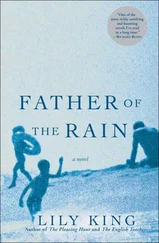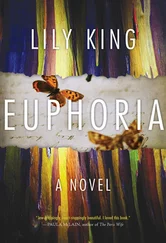At the Exxon station a kid Peter’s age filled up the tank and didn’t even notice a body in the back. But through the doorway of the mini-mart, eating a pink coconut cupcake, a cop was staring right at him. As imperceptibly as he could, Peter tried to lift up his rib cage and harden his expression. He did not catch the cop’s eye again, but looked straight ahead with preoccupation, as if while waiting for his tank to fill he had many adult thoughts to untangle.
Behind him, his mother was stirring. A long swish.
Not now Mom not now he was thinking but didn’t dare move his lips. Peter checked the digits on the pump; it wasn’t even half full. The cop pushed through the door. When he paused to hike up his trousers he left pink sugar fingertip marks on either side. Then he headed directly toward Peter. He put a hand on the roof and bent his head down at the window. Peter fumbled to unroll it.
“I suppose you’ve got your driver’s permit.” He said per mit.
“Yes, sir.”
The cop leaned in farther and addressed the back. “I assume you’re over eighteen and in possession of a valid driver’s license, ma’am.”
In the mirror Peter found his mother upright, open-eyed and nodding.
The cop patted the roof of the car. “Hope you folks enjoy your visit here.”
The kid, who’d been waiting behind the cop, took his place at the window to collect his money. Peter could barely remove the bills from his mother’s purse, his hands were trembling so wildly. The police cruiser pulled out of the parking lot and headed away from the highway. The kid didn’t have enough ones in his pocket and said he’d be right back, but Peter got his hands around the key and took off.
He waited for his mother to speak, to holler at him, and when she didn’t he glanced and saw she’d shut her eyes again, her face clenched as if sleeping hurt.
It took a long time for the shaking to stop, but when it did he felt good. He felt great. He remembered the radio and turned it on. A sign read You Are Leaving Pennsylvania but there was no sign to tell him which state was next.
The sun, which had been flickering through the trees, disappeared. He was hungry again but didn’t want to risk a stop. He sang along to the music and tried not to think about food. All at once the earth seemed to open out and he could see in the dusk long swathes of land and a farmhouse miles and miles away, with a light on. It was like looking across an ocean. He could see the curve of the earth. In that one glimpse of distance he understood so much more about everything he’d ever studied in school: Western expansion, cyclones, O Pioneers! Instead of shutting you up in classrooms for twelve years, why didn’t schools just put you on a bus and show you the world? He’d never known how cramped and ugly New England was until now.
At the risk of waking his mother, Peter rolled down the window to let in this new air. It was much warmer than he’d expected and he stuck out his whole left arm and let his fingers rattle in the wind. There were no other cars on the road and even though it was paved and occasionally signposted, it was easy to pretend he was the first person to travel across it. The exhilaration of freedom coursed through him like a drug. He remembered similar moments, like the time Jason’s sister Carla, before she went to college, picked them up at the movie theater with a hitchhiker in the front seat. They’d driven the guy to an intersection a few miles up the road where he could catch a lift to Canada, he said. He had no bag and no shoes, and when he got out a wave of envy and wanderlust had passed through Peter. That his mother would eventually rouse herself fully and demand he turn around, that he had a geometry exam tomorrow and a history paper due on Friday was information this swell of freedom could not contain. This was his life now; he was a driver heading for parts unknown.
The road began to dim. Then he remembered headlights. He pulled the silver plug and the road ahead glittered. The dotted lines came fast on his left and he tried not to let them distract him. The sky, which had been a vast dome with deep purple clouds, was now close and black and indistinguishable from the land.
Within minutes the dark eroded his exuberance.
“Ma!” he said and got no response. He had the feeling that something terrible was about to happen, that this was how death happened to everyone: a few hours of joy and then you’re snuffed out for good.
An eighteen-wheeler passed on his left, buffeting the Dodge with its wind. The car was flimsy, no longer the haven it had been all day. He felt himself growing younger. He needed to eat, to pee, to sleep. He needed to be taken care of now. But in the backseat his mother just rolled over.
FOR A LONG TIME SHE HUNG ACROSS WALT’S BACK, HIS PACE SLOW AND rhythmic. They didn’t speak. She was drunk and he was dead. He placed her on a small sofa. Her face stuck to the cushion. My legs are too long, she cried, but he had gone. She smiled and nodded at a policeman. It was one of the few things her mother had taught her, to smile and nod at the police. But never seek them out, never call that kind of attention to yourself, no matter what has happened. She taught her that, too.
All the chairs were being taken out of her classroom. Students she didn’t recognize hoisted them, seats down, on their heads and carried them off. She made a barrier with her arms and legs in the doorway but they passed right through her. Fran passed through, too, reading aloud from a yellow sheet of paper, though there was only one word on it: Mom. All the while there was this tugging at her mind that she had forgotten something, but when she strained to remember, the feeling disappeared. For a long stretch of time she dreamt only of the word blunt, the b and the u and the n, a sort of visual onomatopoeia, she decided, over and over.
There was pain in her hip, her shoulder; her lungs were sore and she could only take in shallow breaths. She smelled grass. She was in her bedroom with the fading buttercup wallpaper and her mother was handing her a book. “I just got it out of the library. It’s about a woman who gets—” Vida knew what she was going to say next and lunged, smashing her hand against something hard.
She is walking down an unfamiliar street, searching for clues to where she is. Ahead is a sign but everything is blurred. She hears a voice, a Cockney accent. She’s in London. London! But she can’t see it, and she’s waited so long to get here. Someone takes her arm. It is Carol. Carol who finally read all her notes has forgiven her. They are walking swiftly now, through a huge house full of people. Carol leads her upstairs and down a corridor to a long narrow room. She shoves her in and shuts the door. Her vision clears. In the window a boy is hanging from a necktie. It is Peter. The thing she’s been trying to remember. She is flooded with the pleasure of remembering. Peter. He is dead, but she has remembered him.
“Poor Tess,” someone says behind her.
“Tess? That’s not Tess. That’s my son, Angel.”
She is aware, occasionally, of a door slamming, of a shoulder beneath her, of darkness but not silence. For a few minutes at a time she is lucid. She is in the backseat of a car, her car. She recognizes the roof, the pinpricked vinyl. She remembers Walt’s grave, the countertop at O’Shea’s. Someone must be driving her home from there. Her heart races. When he stops the car he will expect something for his trouble. She returns eagerly to the buttercup wallpaper, the thin curtains rolling in the breeze. She is on her stomach reading. It is a Saturday and no one is home but her and there is a big bowl of peanuts on the table beside her. She eats them one by one, sucking off the salt first, then biting gently so it splits, then letting the halves nestle in either side of her mouth before chewing. It is morning and she can stay up here all day. Downstairs a door slams. He is on her before she registers his feet on the stairs, his weight pressing the air out of her chest, his arms knocking the book from her fingers. She has no air to scream with. She is overwhelmed by the familiarity of the act, the belt, the grunts, the blood in her mouth, as if it has happened not once before but hundreds of times. It is not anger or sadness or fear that she feels, just a habitual acquiescence. Yes, this is what happens to me, her body seems to be saying. When he is done he thanks her. She is not surprised by the voice or the thin ponytail resting on the collar of his jacket as he turns to go.
Читать дальше












